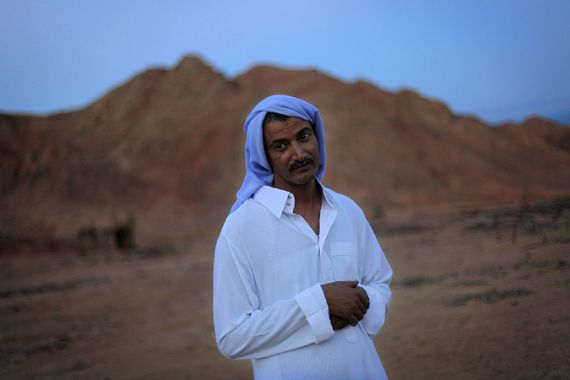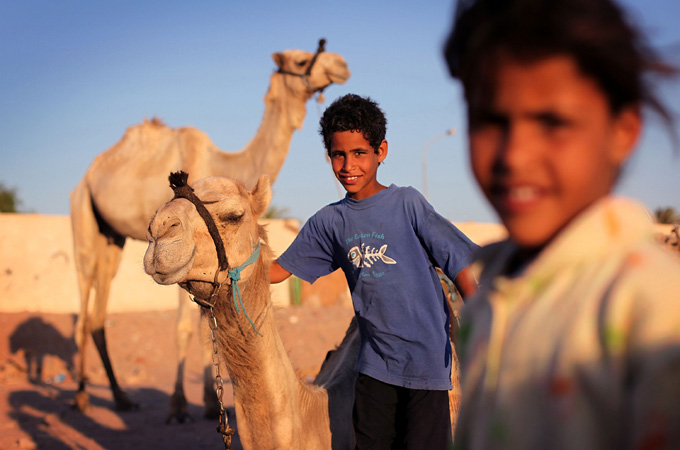No Arab Spring for Egypt’s Bedouin
Bedouin tribesman are increasingly marginalised by Egypt’s central government and the growing tourism industry in Sinai.

 |
| The Bedouin have lived in Egypt’s Sinai Peninsula since the 7th century CE [GALLO/GETTY] |
This article is the third in a series by Ambassador Akbar Ahmed, a former Pakistani high commissioner to the UK, exploring how a litany of volatile centre/periphery conflicts with deep historical roots were interpreted after 9/11 in the new global paradigm of anti-terrorism – with profound and often violent consequences. Incorporating in-depth case studies from Asia, Africa, and the Middle East, Ambassador Ahmed will ultimately argue that the inability for Muslim and non-Muslim states alike to either incorporate minority groups into a liberal and tolerant society or resolve the “centre vs periphery” conflict is emblematic of a systemic failure of the modern state – a breakdown which, more often than not, leads to widespread violence and destruction. The violence generated from these conflicts will become the focus, in the remainder of the 21st century, of all those dealing with issues of national integration, law and order, human rights and justice.
In early February, two American women in their 60s, admiring the rugged beauty of South Sinai around St Catherine’s Monastery – probably squinting under the bright Egyptian sun – were suddenly set upon by armed Bedouin tribesmen in a pick-up truck. The women were robbed of their money and valuables and then, along with their Egyptian tour guide, taken hostage. This kidnapping came in the wake of the abduction of 25 Chinese workers in North Sinai last month by the Bedouin.
The news spread like wildfire. Commentators immediately pointed to a possible al-Qaeda link. There were already reports in the media of the nefarious doings of groups like the Boko Haram in Nigeria and the TTP of Pakistan and their links with al-Qaeda.
What is happening with the Sinai Bedouin?
The Bedouin responsible for these recent kidnappings provide us a clue to the motivation of their actions. In both incidents, they were seeking to put pressure on the government to release their fellow tribesmen detained by the Egyptian authorities, and released their hostages in a matter of hours.
It is a little-known but sad story that the Sinai Bedouin have been suffering decades of neglect and prejudice by the central government. Under President Mubarak’s government, the Bedouin tribes with their nomadic traditions were subject to hostile policies, harassment and economic exclusion; threatened on one side by the growing infringement and exclusion from the tourism industry, and, on the other side, by the security mindset with which the central government views the Bedouin – turning Sinai into a security state. The word Bedouin has unfortunately for them become synonymous with smuggler, spy or terrorist.
|
Bedouins cry foul in Egypt |
Within such a framework, the Bedouin are subject to arbitrary detention, barred the right to own land or participate in the military, and have even been denied citizenship, as with the al-Azazma tribe. Without citizenship, the tribesmen are left with no schools, hospitals or government services, ignored by the centre. This oppression occurs on the lands the Bedouin have lived on through the ebb and flow of history with empires coming and going, dynasties rising and falling.
Shifting sands
The Sinai peninsula has been an important thoroughfare since the time of the Egyptian pharaohs: the Jewish people crossed this wilderness fleeing Egyptian slavery and, atop Mt Sinai, God bestowed upon Moses his 10 commandments. In Arabic, Sinai is known as muftah, or a key space. Waves of invading armies and pilgrims over the centuries have stamped the pages of history into its soil.
However, for over a thousand years, these transient groups, using Sinai as a bridge and rest stop, have passed through the lands of the traditionally nomadic Bedouin tribesmen, the only permanent feature in the shifting sands of Sinai.
The first nomadic Bedouin tribes migrated into Sinai beginning in the 7th century CE, offshoots of the major tribes of the Hejaz region of present-day Saudi Arabia. In the harsh and sparse desert landscape of Sinai, they lived by a code of honour, hospitality and revenge based in their intricate kinship system. This tribal code, urfi, was able to regulate order and justice in the desert independent of any structured legal or political institutions.
This independence and general wariness towards central authority have defined the Bedouin and created tension with the centre. The government, leaving the Bedouin to regulate their own affairs, interacted largely on the basis of protection of trade routes and Hajj pilgrims. The first British agent in Sinai, W E Jennings-Bramley, noted in 1910 that he saw only one manned government garrison, housing the regional governor and 10 soldiers.
The increased presence of the government in Sinai led to the division of the Bedouin between British Egypt and the Ottoman Empire in 1906. This division became the permanent border between Egypt and Israel in 1948 and had little bearing on the reality of the tribes, splitting brother from brother. This arbitrary division between the two countries has resulted in the Sinai Bedouin being viewed with suspicion as Zionist conspirators by the Egyptian government, given the presence of their kinsmen in the Negev Desert and the Israeli occupation of Sinai from 1967-1982. Yet the same people are labelled Islamic terrorists by Egyptian and Israeli authorities during periods of strife.
Security threat?
In Sinai, the Bedouin are seen from the prism of a consistent security threat to the state, evidenced by the response to the bombing in 2004 in Taba, Sinai. Despite having already named the nine suspects, the Egyptian security services began mass arrests throughout North Sinai. Egyptian human rights organisations reported nearly 3,000 people were arrested and held without charge and subject to torture. Women and children were also arrested “as pawns to force men to turn themselves in”. They began arresting individuals with beards as “presumed adherents of Islamist congregations”.
Alas, the fall of President Mubarak in February 2011 has not changed this security perspective on Sinai. In August 2011, six months after Mubarak stepped down, the military, with the permission of Israel, launched Operation Eagle, the deployment of two Special Forces brigades to crack down on “militancy” and restore law and order to Sinai. A further 2,000 troops were deployed in December 2011.
In addition to coping with the continued presence of Egyptian security forces, Bedouin must also cope with the continued presence of tourists. The tourist industry in Sinai quickly expanded during the 1990s. By 2000, 24 per cent of all the hotel rooms in Egypt were located here.
|
“Bedouin are faced with the choice or either abandoning their traditions to travel for work or revert to illegal smuggling practices.” |
The Bedouin were cast aside to make way for hotels and resorts, removed from their own land which had been an integral aspect of their traditional way of life for centuries. Their land ownership was denied by the government. Their only concession was to become hotel guards or day labourers. The remainder of the positions was filled by the migration of Egyptian workers from the Nile Valley and Delta.
Lack of investment outside of the tourism sector and lack of economic activity has led to high unemployment. Bedouin are faced with the choice of either abandoning their traditions to travel for work or revert to illegal smuggling practices, one of the “causes” of the security apparatus present in the peninsula. Throughout history, the Bedouin have fallen back on smuggling when other sources of revenue have disappeared. The security-first policy of the central government does little to resolve the gross rates of poverty and economic marginalisation in Sinai.
Justice, compassion and welfare
Now with the Arab Spring spearheading one of the most exciting democratic revolutions in modern history, started in Tunisia and picked up by Egypt, the Arab world has been changed forever. The real test of democratic rule in Egypt will be the inclusion of its periphery, the extension of rights, citizenship and justice to all people regardless of ethnicity or religion. The Muslim Bedouin and the Christian Copts alike must be given a voice.
The Muslim Brotherhood’s Freedom and Justice Party, following the recent elections, are, for the first time in history, represented in large numbers in Parliament. Given their commitment to their Islamic faith, they must further incorporate and provide for their fellow Muslims, the Bedouin, if any peace and prosperity is to be found in Sinai.
Both the Holy Quran and the Prophet of Islam emphasise the obligation of the ruler to care for the poor and dispossessed; to treat them with justice, compassion and welfare. The Bedouin, as among the poorest and most dispossessed in Egypt, need the most compassion and assistance.
The exhilaration of present-day Egyptians for the ideals of democracy is, however, matched by the lack of democratic precedent in living memory, given Egypt’s subjection to rule by the cult of the despotic military dictator and, prior to this, imperial colonisation from the British to the Ottoman Empires. Let us look to distant history and to one of Egypt’s most shining and celebrated leaders, Saladin.
Visitors to Cairo are struck by the monuments and mosques associated with the great Saladin’s rule nearly a thousand years ago. Saladin is celebrated above all because of his commitment to the Islamic obligation of compassion to the poor and marginalised within his domain. His magnanimity towards his people was so sweeping that, at his death, his only possessions consisted of the equivalent of a few dollars, a copy of his favorite Quran, a saddle and sword, having given away the remainder to his subjects. This serves as a stark contrast to the array of military dictators in the Muslim world who have pillaged and killed their citizens.
If there is no Saladin to lead Egypt today, Egyptians must be inspired by his ideals of justice and compassion that won him the respect of his people. Just as Egypt’s national flag bears the eagle of Saladin, a democratic Egypt should bear the principles of Saladin. Only by reviving such ideals can all Egyptians, including the Bedouin, fully realise the aspirations of the Arab Spring.
This article was written by Akbar Ahmed and Harrison Akins. Professor Akbar Ahmed is Ibn Khaldun Chair of Islamic Studies at American University in Washington DC and the former Pakistani High Commissioner to the United Kingdom.
Harrison Akins is an Ibn Khaldun Chair Research Fellow at American University’s School of International Service and is assisting Professor Ahmed on Ahmed’s forthcoming study, Journey into Tribal Islam: America and the Conflict between Center and Periphery in the Muslim World, to be published by Brookings Press.